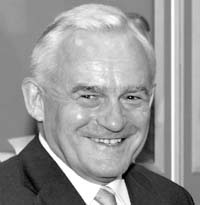Poland’s Hand of Friendship Becomes More Reserved

The thirteenth annual economic forum, which traditionally brings together state leaders, political figures, and business sharks at the Krynica mountain resort in Poland sometimes called the Polish Davos, this time discussed the question if the current stage of the EU enlargement would be the last. The forum was also characterized by a pronounced Balkan accent: for the first time its guests included the presidents of Croatia and Macedonia, and serious attention was given to the problems of this region. Slovak leader Mikulas Dzurinda was recognized Prime Minister of the Year, while the National Bank of Ukraine was named the best financial organization of the last year. The Ukrainian theme aroused lively interest, in spite of the fact that President Kuchma did not make it to Krynica, while opposition leaders in fact said nothing new. Poland’s President Aleksander Kwasniewski and Prime Minister Leszek Miller spoke about their country’s will to support Ukraine and see it in the common European and Euro-Atlantic space. The forum, being informal per se, was unable to pass any decisions.
A number of issues were discussed in the general discourse of the Ukrainian theme: what is the correlation between the Single Economic Space and European choice, prospects for the Odesa- Brody pipeline and its reverse exploitation, Ukraine’s political situation, its relations with NATO and Russia. Representatives of Ukraine’s government First Deputy Minister of Foreign Affairs Oleksandr Chaly and Minister for Fuel and Energy Serhiy Yermilov assured the forum’s guests that Kyiv adheres to its announced European choice. At that, in Mr. Chaly’s words, a formula for Ukraine’s participation could be “integration without membership,” following Norway and Switzerland’s example. This was news for many of those present. Another piece of news was the fact that, in Minister Yermilov’s words, commercial oil pumping through Odesa-Brody line can start as early as October 21. There are already agreements on purchasing 4-5 million ton of oil by European oil refineries, and there is a possibility to pump 9 million ton per year. Kyiv counts on precisely this volume of signed contracts. Prime Minister Miller announced that he, together with his Ukrainian counterpart, sent a letter to the European Commission with request to support the project. However, the reverse pumping question remains on the agenda: Kyiv points out the need for an independent expert examination to assess the appropriateness of one or other decision.
For many it came as a surprise that, according to statistics, the volume of Ukraine’s trade with the CIS states and Russia is declining every year, while with the EU member and candidate countries it is growing. There was a feeling that neither Poland nor the West understand the reasons for the Ukrainian government’s unexpected decision on the SES, especially considering that many ministries do not support it. Speaking about Poland’s support to Ukraine on its road to Europe, this is conditional: President Kwasniewski insisted on Kyiv making a strategic decision, and Prime Minister Miller on its meeting the necessary criteria and achieving political stability.
The Ukrainian part of the forum could have been even more successful. Its organizers provided special time for presenting Ukraine itself and joint Polish-Ukrainian projects by Ukraine’s president. Representatives of the organizing committee said that they understand the reason for his unexpected refusal, though they did not receive any official explanation.
However, it would be wrong to say that this fact had any negative impact on developing the dialog between Kyiv and Warsaw. In spite of the presence in the context of bilateral relations a delicate subject of the sixtieth anniversary of the Volyn events, this year proved quite fruitful in terms of coming to important agreements. In part, this refers to the asymmetrical model of visa regime to take effect starting October 1. In fact, unlike Russia and Belarus, Ukraine turned down the mutuality principle on the visa issue. In addition, this year Ukraine and Poland succeeded in involving the European Commission in the project to transport Caspian oil through their territories (the Eurasian oil transport corridor).
Experts claim that the visa model along with the Eurasian corridor and many other things might look quite different if not for Ukraine’s present ambassador to Poland. All the more questions arise in connection with the unpleasant incident that happened to him in Warsaw. However, that is another story.
Thus, Ukraine is expected to clearly define its priorities and take appropriate actions. However, they still have trust in it.
Participation by The Day’s journalist in the forum was made possible by support of the Polish-American-Ukrainian Cooperation Initiative (PAUCI).






